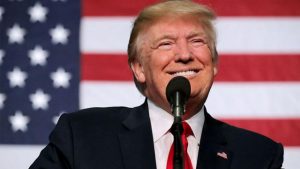 The Constitution prohibits the president from accepting payments from foreign and domestic governments. President Trump owns hotels and other properties that are frequented by foreign and domestic government officials.
The Constitution prohibits the president from accepting payments from foreign and domestic governments. President Trump owns hotels and other properties that are frequented by foreign and domestic government officials.
These facts, claim plaintiffs in two lawsuits that have cleared several hurdles, add up to repeated and multiple violations of the Constitution by the president.
Didn’t Trump say he was distancing himself from his business?
Yes, days before his inauguration, Mr. Trump resigned his role and turned over management of the Trump Organization to his two eldest sons and a longtime company executive through a trust.
Past presidents have used a blind trust, in which an independent trustee reported to them on the value of the trust but not what was in it. But Mr. Trump’s trust is controlled by his family and a close associate and he receives updates about his business. He remains its sole beneficiary.
After he was elected, ethics experts from both parties urged Mr. Trump to put all of his assets with the potential for conflicts of interest into a blind trust. Mr. Trump and his lawyers have cited several reasons why they did not, including that “conflicts of interest laws simply do not apply to the president.”
The lawsuits allege that the president has violated the Constitution.
Two lawsuits accuse Mr. Trump of violating the foreign and domestic emoluments clauses of the Constitution: one brought by the attorneys general of Maryland and Washington, D.C., and the other by Democratic members of Congress. The foreign clause reads:
ARTICLE 1, SECTION 9, CLAUSE 8
No Title of Nobility shall be granted by the United States: And no Person holding any Office of Profit or Trust under them, shall, without the Consent of the Congress, accept of any present, Emolument, Office, or Title, of any kind whatever, from any King, Prince, or foreign State.
In its motion to dismiss the attorneys general lawsuit, the Justice Department argued that the foreign emoluments clause was meant only to bar federal officials from providing a service to a foreign government. That motion was denied.
“The president was advancing an absurdly narrow definition of emoluments that was contrary to government precedent and practice,” said Norman L. Eisen, chairman of the Citizens for Responsibilities and Ethics in Washington and co-counsel for the plaintiffs. “The government has applied the emoluments clauses in very broad fashion for centuries.”
The Justice Department asked a federal appeals court on Monday to throw out or at least temporarily halt the attorneys general lawsuit.
Both lawsuits are historic because the definition of an illegal emolument has never been litigated. Here are some examples of alleged violations they cite:
The Trump International Hotel opened about two months before the 2016 presidential election. It’s in the Old Post Office building on Pennsylvania Avenue, just blocks from the White House. In addition to officials from Kuwait, dozens of other government officials have patronized the hotel since Mr. Trump came into office, including …
… the Kingdom of Saudi Arabia, which paid for rooms, food and parking in January and February 2017.
… the prime minister of Malaysia and an entourage of Malaysian diplomats, who held meetings and stayed at the hotel in September 2017.
… Georgia’s ambassador to the United Nations, who stayed at the hotel in April 2017.
… the governor of Maine and members of his staff, who stayed at the hotel and dined at its restaurants in February 2017.
Plaintiffs also say that Mr. Trump has illegally received benefits from decisions made by the federal government, including …
… the General Services Administration’s determination that the Trump Organization is in “full compliance” with its lease for the Old Post Office building, even though the lease forbids any elected federal official from being a part of it.
… approval from the National Park Service for a historic-preservation tax credit.
Mr. Trump has said he deliberately built Trump World Tower, a residential condominium, near the United Nations because he “saw great potential right across the street.” Several other countries also own units and presumably pay monthly building charges.
Before he moved to the White House, Mr. Trump lived and worked at Trump Tower, the Fifth Avenue skyscraper with gold-painted elevators that serves as the headquarters for the Trump Organization.
Mr. Trump earns royalties from the distribution of The Apprentice and its spinoffs in dozens of countries.
Mr. Trump also owns, operates and licenses numerous properties and business ventures in many other countries, including Indonesia, Scotland and the Philippines.
Many of the trademarks that were approved by the Chinese government after Mr. Trump took office had previously been rejected, according to the lawsuit filed by Democratic members of Congress.
